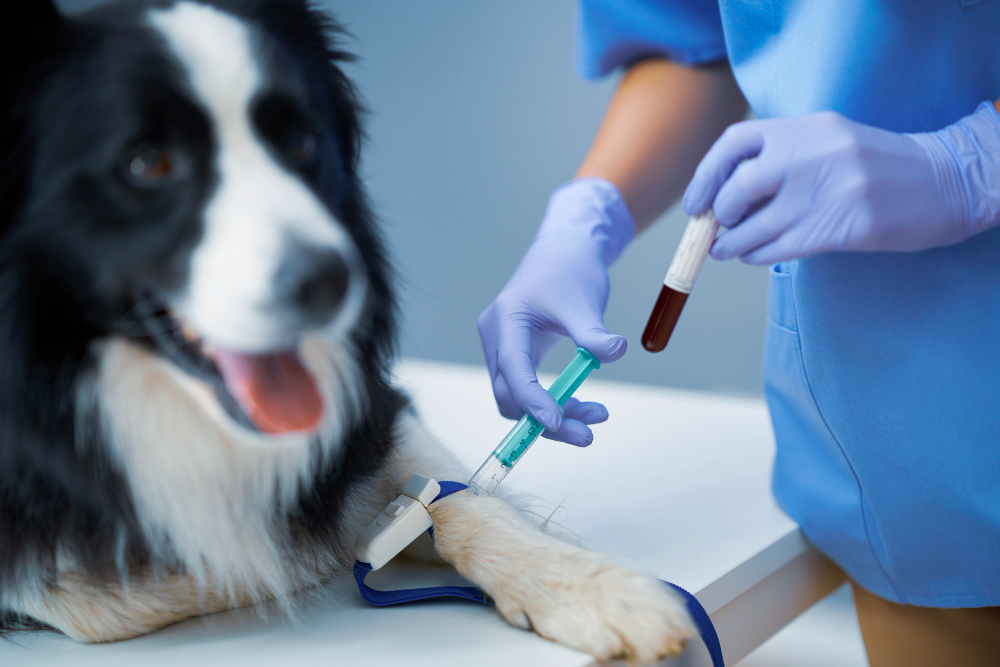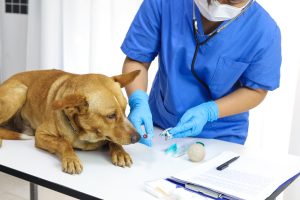How Much Does a Full Blood Panel Cost for a Dog?

Updated October 13, 2025
Understanding the costs of your dog’s blood work helps you make informed decisions about their healthcare. Blood panels are essential diagnostic tools that provide comprehensive insights into your dog’s health, from detecting early-stage diseases to monitoring ongoing conditions. That’s why we’ve put together this comprehensive guide to help you navigate the costs and understand what you’re paying for.
What You Can Expect to Pay
A routine full blood panel for dogs typically costs between $100 and $200, which usually includes a Complete Blood Count (CBC) and chemistry panel, according to Dogster, Vety, and PetMD. However, costs can vary significantly based on several factors, with some comprehensive panels reaching $300-$450 or more.
Here’s what you need to know about the different types of blood tests and their associated costs.
Types of Blood Tests and Their Costs
Basic Blood Panel ($100-$200)
A basic blood panel provides a general overview of your dog’s health and is often used during routine check-ups. This typically includes essential tests such as a Complete Blood Count (CBC), which measures red and white blood cells, hemoglobin levels, and platelets to assess overall health, immune function, and potential infections, plus a blood chemistry panel that evaluates kidney and liver function, blood sugar, and electrolytes.
Comprehensive/Senior Blood Panel ($150-$450)
According to Senior Dog Revolution, senior dogs are most at risk of having health issues, so vets recommend comprehensive testing, including biochemistry profile, complete blood count, thyroid hormone testing, and urinalysis. All of these blood and urine tests can cost you around $150 to $450 on average, depending on several factors, including your location, the urgency of the tests, and other specific circumstances.
Real-world examples from dog owners on the Golden Retriever Forum show this range in action:
- One Golden Retriever owner in Orlando, Florida, paid $336 for a senior bloodwork panel
- Another owner in South Florida reported $201 for a comprehensive senior panel and urinalysis with bloodwork run in-house
- In North Carolina, a senior panel with fecal, urinalysis, thyroid, blood count, including heartworm and parasite testing costs $165 plus $54 for the exam.
Specialized Blood Tests
According to Vety, blood work to evaluate your dog’s thyroid function costs $70 to $200, while blood testing for allergies costs $200 to $700.
Understanding The Components Of A Complete Blood Panel
When your veterinarian recommends blood work, it’s helpful to understand exactly what they’re testing for and why each component matters for your dog’s health.
Complete Blood Count (CBC)
A CBC checks your pet’s red blood cells (RBCs), white blood cells (WBCs), and platelets to find conditions such as dehydration, infection, and anemia. These factors can indicate your dog’s hydration status, potential infections or anemia, immune system response, and blood clotting abilities.
Biochemistry Profile
A biochemistry profile checks your pet’s organ function, measures electrolyte levels, and finds certain enzyme levels. This crucial component helps veterinarians assess how well your dog’s liver, kidneys, and pancreas are functioning.
Additional Components You Might See
Depending on the panel your veterinarian recommends, your dog’s blood work may also include:
- Thyroid panel – a thyroid panel checks your pet’s thyroid function.
- Urinalysis test provides a picture of how well the kidneys and urinary system are working, and is also helpful for the diagnosis of diabetes and cancer.
- Heartworm test – a heartworm test shows if your pet has heartworm disease and can also detect certain tick-borne illnesses such as Lyme disease.
Factors That Impact Your Blood Panel Costs
Several factors can significantly affect how much you’ll pay for your dog’s blood work. Understanding these can help you budget and potentially save money.
Geographic Location Makes a Difference
Where you live can play a significant part in how much you spend on blood work. Rural clinics are generally more affordable than those located within cities. For example, a clinic in downtown Los Angeles is likely to cost more than a clinic in a far-out suburb.
In-House vs. External Laboratory Testing
Blood work analyzed in-house at your vet’s office typically costs less than if the sample must be sent to an outside lab for analysis. Catster explains that sending blood to an outside lab can increase the price by $100 or more, depending on the test in question.
Your Dog’s Age and Health Status
It is noted that senior dogs may require blood work to detect health conditions that often develop with age, such as cancer or thyroid problems. Older dogs are also more likely to be on medications that require blood tests more frequently to monitor liver and kidney functions.
Test Complexity and Number of Parameters
A more comprehensive panel with additional tests can cost up to $1,500 or more in some cases. According to Dogster, the cost of blood work depends on several factors: the type of blood test, the number of parameters to be checked, and whether the blood work is paired with other diagnostic tests.
When Your Dog Needs Blood Work
Understanding when blood work is necessary can help you prepare for these costs and recognize their importance in your dog’s healthcare routine.
Routine Wellness Screening
Annual blood tests, such as a CBC and biochemistry panel, help find conditions in the early stages when they’re easier to manage. Regular wellness tests allow you and your vet to spot anything abnormal — even when your dog isn’t displaying symptoms.
Pre-Surgical Requirements
Blood work is needed before a pet has anesthesia to ensure they’re healthy enough for a procedure.
Diagnostic Purposes
If your pet is sick, blood work can help determine the cause and allow your veterinarian to create the right treatment plan.
Monitoring Chronic Conditions
Blood tests can help monitor chronic conditions like diabetes, cancer, allergies, or kidney disease.
What to Expect During the Testing Process
Understanding the process of blood work can help alleviate any anxiety you may have about the procedure for your dog.
The initial drawing of your dog’s blood takes just a few seconds, while the testing itself can take anywhere from a few minutes to a few days, depending on where the blood sample will be processed. Most veterinary clinics have in-house testing equipment that enables your veterinarian to discuss the results immediately. Simple CBC chemistry and urinalysis can both be handled within about 30 minutes.
The more in-depth blood panels aren’t usually handled in-house. Tests that include hormone assessment, such as thyroid panels, might be sent to outside labs for further testing.
Additional Costs to Keep in Mind
When budgeting for your dog’s blood work, remember that there may be additional expenses beyond the test itself.
Examination Fees
Veterinarians typically charge a separate exam or office visit fee in addition to the cost of the blood test itself. Vety reports that the average cost of a vet visit is $40 to $80 for the office visit fee, which typically includes a physical exam.
Follow-up Testing
If initial results show abnormalities, your veterinarian may recommend additional tests, which would incur extra costs. It’s important to be prepared for this possibility.
How Can Pet Insurance Help if Your Dog Needs Blood Work?
Pet insurance can be a valuable tool in managing the costs of treating a dog’s veterinary expenses. By having a pet insurance policy in place, you can have peace of mind knowing that you can provide medical care for your furry companion without worrying about the financial burden. Pet insurance can help cover the costs of veterinary consultations, diagnostic tests, medications, and even specialized treatments if required.
Reimbursement
This method is the most common for pet insurance companies. You pay out of pocket for the veterinarian bill, and then the insurance company reimburses you for what’s covered under the insurance plan. The steps look like this.
- You pay the vet bill after your dog’s visit.
- You fill out the pet insurance claim form.
- Submit the claim form and other required documentation to the insurer.
- After the claim is approved, you will be reimbursed for eligible expenses.
What Does Odie Pet Insurance Cover?
Pet insurance covers various veterinary expenses, providing financial protection and peace of mind for pet owners. Here are the details of the coverage options offered by Odie Pet Insurance:
Illness & Injury Plan
The Illness & Injury Plan is an all-inclusive insurance plan designed to cover a wide range of medical needs for your pet. This plan includes comprehensive coverage for various illnesses, injuries, and veterinary services. Some of the covered items include:
- Veterinary exams and consultations
- Diagnostics (e.g., X-rays, lab tests)
- Prescribed medications
- Surgeries and hospitalization
- Rehabilitation, acupuncture, or chiropractic treatments
- Medically necessary supplies
- Euthanasia and cremation
The Wellness Plan
The Wellness Plan is a monthly membership that focuses on preventive care and covers routine veterinary services.
- Provides reimbursements for routine care items, including wellness visits (exams and vaccines), testing and parasite prevention, dental cleanings and at-home dental care, vitamins, supplements, and more.
- Through Odie’s partnership with Petivity, a leader in smart pet products and proactive care, Wellness Plan members can also receive reimbursements for Petivity devices and health kits, as well as eligible Purina food and supplements.
- Total reimbursement up to $700 per year.
Full Blood Panel Cost for Dogs FAQs
How much does a full blood panel cost for dogs?
A routine blood panel typically costs $100-$200, including Complete Blood Count (CBC) and chemistry panel. Comprehensive senior panels range from $150-$450+ depending on additional tests. Costs vary by location, type of tests, urgency, and whether testing is in-house or sent to external labs.
What’s included in dog blood work and what does it check for?
- CBC ($100-$300): Measures red/white blood cells and platelets; checks for dehydration, infections, anemia, immune issues, and clotting problems.
- Chemistry Panel ($100-$200): Evaluates liver, kidney, and pancreas function, blood sugar, and electrolytes.
- Additional tests: Thyroid ($70-$200), allergies ($200-$700), heartworm, and specialized panels ($100-$500+).
When does my dog need blood work?
Blood work is recommended for routine wellness exams (annually for adults, twice yearly for seniors), pre-surgery screening, when sick or injured, monitoring chronic conditions, and assessing medication response. Senior dogs need comprehensive testing to detect age-related issues early.
How long does it take to get results?
In-house testing provides results in 30 minutes to a few hours. External lab testing takes 1-3 days or longer for specialized tests. Rush testing may be available for emergencies at additional cost.
Does pet insurance cover blood work?
Yes. Odie’s Illness & Injury Plan covers diagnostic blood work for sick/injured pets, laboratory work, and treatment for diagnosed conditions.
How can I save money on blood work?
Ask about wellness packages or bundled services, check for low-cost veterinary clinics, consider pet insurance with wellness coverage, inquire about payment plans, and prioritize essential tests with your vet if budget is a concern.




